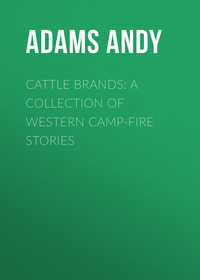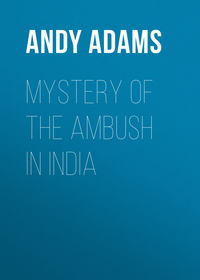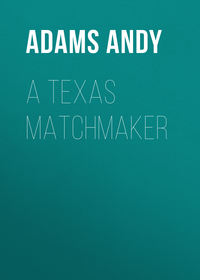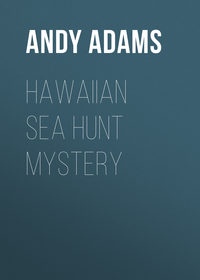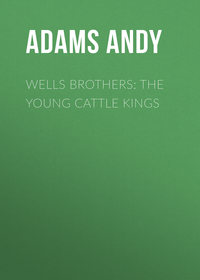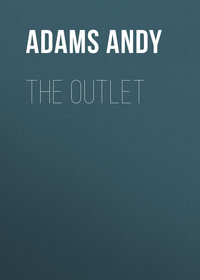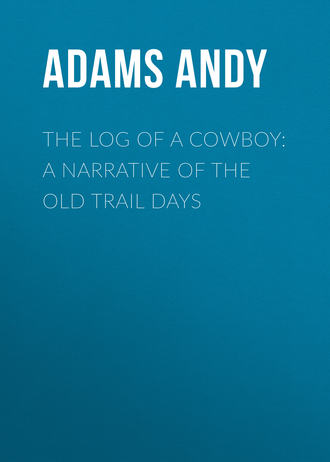 полная версия
полная версияThe Log of a Cowboy: A Narrative of the Old Trail Days
"What's her brand, Fox?" asked Flood.
"She's a 'Q' cow, but the colonel here thinks it's an 'O.' I happen to know the cow and the brand both; she came into the herd four hundred miles south of here while we were watering the herd in the Nueces River. The 'Q' is a little dim, but it's plenty plain to hold her for the present."
"If she's a 'Q' cow I have no claim on her," protested the stranger, "but if the brand is an 'O,' then I claim her as a stray from our range, and I don't care if she came into your herd when you were watering in the San Fernando River in Old Mexico, I'll claim her just the same. I'm going to ask you to throw her."
"I'll throw her for you," coolly replied Fox, "and bet you my saddle and six-shooter on the side that it isn't an 'O,' and even if it was, you and all the thieves on the Concho can't take her. I know a few of the simple principles of rustling myself. Do you want her thrown?"
"That's what I asked for."
"Throw her, then," said Flood, "and don't let's parley."
Fox rode back in to the herd, and after some little delay, located the cow and worked her out to the edge of the cattle. Dropping his rope, he cut her out clear of the herd, and as she circled around in an endeavor to reenter, he rode close and made an easy cast of the rope about her horns. As he threw his horse back to check the cow, I rode to his assistance, my rope in hand, and as the cow turned ends, I heeled her. A number of the outfit rode up and dismounted, and one of the boys taking her by the tail, we threw the animal as humanely as possible. In order to get at the brand, which was on the side, we turned the cow over, when Flood took out his knife and cut the hair away, leaving the brand easily traceable.
"What is she, Jim?" inquired Fox, as he sat his horse holding the rope taut.
"I'll let this man who claims her answer that question," replied Flood, as her claimant critically examined the brand to his satisfaction.
"I claim her as an 'O' cow," said the stranger, facing Flood.
"Well, you claim more than you'll ever get," replied our foreman.
"Turn her loose, boys."
The cow was freed and turned back into the herd, but the claimant tried to argue the matter with Flood, claiming the branding iron had simply slipped, giving it the appearance of a "Q" instead of an "O" as it was intended to be. Our foreman paid little attention to the stranger, but when his persistence became annoying checked his argument by saying,—
"My Christian friend, there's no use arguing this matter. You asked to have the cow thrown, and we threw her. You might as well try to tell me that the cow is white as to claim her in any other brand than a 'Q.' You may read brands as well as I do, but you're wasting time arguing against the facts. You'd better take your 'Window Sash' cattle and ride on, for you've cut all you're going to cut here to-day. But before you go, for fear I may never see you again, I'll take this occasion to say that I think you're common cow thieves."
By his straight talk, our foreman stood several inches higher in our estimation as we sat our horses, grinning at the discomfiture of the trail cutters, while a dozen six-shooters slouched languidly at our hips to give emphasis to his words.
"Before going, I'll take this occasion to say to you that you will see me again," replied the leader, riding up and confronting Flood. "You haven't got near enough men to bluff me. As to calling me a cow thief, that's altogether too common a name to offend any one; and from what I can gather, the name wouldn't miss you or your outfit over a thousand miles. Now in taking my leave, I want to tell you that you'll see me before another day passes, and what's more, I'll bring an outfit with me and we'll cut your herd clean to your road brand, if for no better reasons, just to learn you not to be so insolent."
After hanging up this threat, Flood said to him as he turned to ride away, "Well, now, my young friend, you're bargaining for a whole lot of fun. I notice you carry a gun and quite naturally suppose you shoot a little as occasion requires. Suppose when you and your outfit come back, you come a-shooting, so we'll know who you are; for I 'll promise you there's liable to be some powder burnt when you cut this herd."
Amid jeers of derision from our outfit, the trail cutters drove off their three lonely "Window Sash" cattle. We had gained the point we wanted, and now in case of any trouble, during inspection or at night, we had the river behind us to catch our herd. We paid little attention to the threat of our disappointed callers, but several times Straw's remarks as to the character of the residents of those hills to the westward recurred to my mind. I was young, but knew enough, instead of asking foolish questions, to keep mum, though my eyes and ears drank in everything. Before we had been on the trail over an hour, we met two men riding down the trail towards the river. Meeting us, they turned and rode along with our foreman, some distance apart from the herd, for nearly an hour, and curiosity ran freely among us boys around the herd as to who they might be. Finally Flood rode forward to the point men and gave the order to throw off the trail and make a short drive that afternoon. Then in company with the two strangers, he rode forward to overtake our wagon, and we saw nothing more of him until we reached camp that evening. This much, however, our point man was able to get from our foreman: that the two men were members of a detachment of Rangers who had been sent as a result of information given by the first herd over the trail that year. This herd, which had passed some twenty days ahead of us, had met with a stampede below the river, and on reaching Abilene had reported the presence of rustlers preying on through herds at the crossing of the Colorado.
On reaching camp that evening with the herd, we found ten of the Rangers as our guests for the night. The detachment was under a corporal named Joe Hames, who had detailed the two men we had met during the afternoon to scout this crossing. Upon the information afforded by our foreman about the would-be trail cutters, these scouts, accompanied by Flood, had turned back to advise the Ranger squad, encamped in a secluded spot about ten miles northeast of the Colorado crossing. They had only arrived late the day before, and this was their first meeting with any trail herd to secure any definite information.
Hames at once assumed charge of the herd, Flood gladly rendering every assistance possible. We night herded as usual, but during the two middle guards, Hames sent out four of his Rangers to scout the immediate outlying country, though, as we expected, they met with no adventure. At daybreak the Rangers threw their packs into our wagon and their loose stock into our remuda, and riding up the trail a mile or more, left us, keeping well out of sight. We were all hopeful now that the trail cutters of the day before would make good their word and return. In this hope we killed time for several hours that morning, grazing the cattle and holding the wagon in the rear. Sending the wagon ahead of the herd had been agreed on as the signal between our foreman and the Ranger corporal, at first sight of any posse behind us. We were beginning to despair of their coming, when a dust cloud appeared several miles back down the trail. We at once hurried the wagon and remuda ahead to warn the Rangers, and allowed the cattle to string out nearly a mile in length.
A fortunate rise in the trail gave us a glimpse of the cavalcade in our rear, which was entirely too large to be any portion of Straw's outfit; and shortly we were overtaken by our trail cutters of the day before, now increased to twenty-two mounted men. Flood was intentionally in the lead of the herd, and the entire outfit galloped forward to stop the cattle. When they had nearly reached the lead, Flood turned back and met the rustlers.
"Well, I'm as good as my word," said the leader, "and I'm here to trim your herd as I promised you I would. Throw off and hold up your cattle, or I'll do it for you."
Several of our outfit rode up at this juncture in time to hear Flood's reply: "If you think you're equal to the occasion, hold them up yourself. If I had as big an outfit as you have, I wouldn't ask any man to help me. I want to watch a Colorado River outfit work a herd,—I might learn something. My outfit will take a rest, or perhaps hold the cut or otherwise clerk for you. But be careful and don't claim anything that you are not certain is your own, for I reserve the right to look over your cut before you drive it away."
The rustlers rode in a body to the lead, and when they had thrown the herd off the trail, about half of them rode back and drifted forward the rear cattle. Flood called our outfit to one side and gave us our instructions, the herd being entirely turned over to the rustlers. After they began cutting, we rode around and pretended to assist in holding the cut as the strays in our herd were being cut out. When the red "Q" cow came out, Fox cut her back, which nearly precipitated a row, for she was promptly recut to the strays by the man who claimed her the day before. Not a man of us even cast a glance up the trail, or in the direction of the Rangers; but when the work was over, Flood protested with the leader of the rustlers over some five or six head of dim-branded cattle which actually belonged to our herd. But he was exultant and would listen to no protests, and attempted to drive away the cut, now numbering nearly fifty head. Then we rode across their front and stopped them.
In the parley which ensued, harsh words were passing, when one of our outfit blurted out in well feigned surprise,—
"Hello, who's that, coming over there?"
A squad of men were riding leisurely through our abandoned herd, coming over to where the two outfits were disputing.
"What's the trouble here, gents?" inquired Hames as he rode up.
"Who are you and what might be your business, may I ask?" inquired the leader of the rustlers.
"Personally I'm nobody, but officially I'm Corporal in Company B, Texas Rangers—well, if there isn't smiling Ed Winters, the biggest cattle thief ever born in Medina County. Why, I've got papers for you; for altering the brands on over fifty head of 'C' cattle into a 'G' brand. Come here, dear, and give me that gun of yours. Come on, and no false moves or funny work or I'll shoot the white out of your eye. Surround this layout, lads, and let's examine them more closely."
At this command, every man in our outfit whipped out his six-shooter, the Rangers leveled their carbines on the rustlers, and in less than a minute's time they were disarmed and as crestfallen a group of men as ever walked into a trap of their own setting. Hames got out a "black book," and after looking the crowd over concluded to hold the entire covey, as the descriptions of the "wanted" seemed to include most of them. Some of the rustlers attempted to explain their presence, but Hames decided to hold the entire party, "just to learn them to be more careful of their company the next time," as he put it.
The cut had drifted away into the herd again during the arrest, and about half our outfit took the cattle on to where the wagon camped for noon. McCann had anticipated an extra crowd for dinner and was prepared for the emergency. When dinner was over and the Rangers had packed and were ready to leave, Hames said to Flood,—
"Well, Flood, I'm powerful glad I met you and your outfit. This has been one of the biggest round-ups for me in a long time. You don't know how proud I am over this bunch of beauties. Why, there's liable to be enough rewards out for this crowd to buy my girl a new pair of shoes. And say, when your wagon comes into Abilene, if I ain't there, just drive around to the sheriff's office and leave those captured guns. I'm sorry to load your wagon down that way, but I'm short on pack mules and it will be a great favor to me; besides, these fellows are not liable to need any guns for some little time. I like your company and your chuck, Flood, but you see how it is; the best of friends must part; and then I have an invitation to take dinner in Abilene by to-morrow noon, so I must be a-riding. Adios, everybody."
CHAPTER VIII
ON THE BRAZOS AND WICHITA
As we neared Buffalo Gap a few days later, a deputy sheriff of Taylor County, who resided at the Gap, rode out and met us. He brought an urgent request from Hames to Flood to appear as a witness against the rustlers, who were to be given a preliminary trial at Abilene the following day. Much as he regretted to leave the herd for even a single night, our foreman finally consented to go. To further his convenience we made a long evening drive, camping for the night well above Buffalo Gap, which at that time was little more than a landmark on the trail. The next day we made an easy drive and passed Abilene early in the afternoon, where Flood rejoined us, but refused any one permission to go into town, with the exception of McCann with the wagon, which was a matter of necessity. It was probably for the best, for this cow town had the reputation of setting a pace that left the wayfarer purseless and breathless, to say nothing about headaches. Though our foreman had not reached those mature years in life when the pleasures and frivolities of dissipation no longer allure, yet it was but natural that he should wish to keep his men from the temptation of the cup that cheers and the wiles of the siren. But when the wagon returned that evening, it was evident that our foreman was human, for with a box of cigars which were promised us were several bottles of Old Crow.
After crossing the Clear Fork of the Brazos a few days later, we entered a well-watered, open country, through which the herd made splendid progress. At Abilene, we were surprised to learn that our herd was the twentieth that had passed that point. The weather so far on our trip had been exceptionally good; only a few showers had fallen, and those during the daytime. But we were now nearing a country in which rain was more frequent, and the swollen condition of several small streams which have their headwaters in the Staked Plains was an intimation to us of recent rains to the westward of our route. Before reaching the main Brazos, we passed two other herds of yearling cattle, and were warned of the impassable condition of that river for the past week. Nothing daunted, we made our usual drive; and when the herd camped that night, Flood, after scouting ahead to the river, returned with the word that the Brazos had been unfordable for over a week, five herds being waterbound.
As we were then nearly twenty miles south of the river, the next morning we threw off the trail and turned the herd to the northeast, hoping to strike the Brazos a few miles above Round Timber ferry. Once the herd was started and their course for the day outlined to our point men by definite landmarks, Flood and Quince Forrest set out to locate the ferry and look up a crossing. Had it not been for our wagon, we would have kept the trail, but as there was no ferry on the Brazos at the crossing of the western trail, it was a question either of waiting or of making this detour. Then all the grazing for several miles about the crossing was already taken by the waterbound herds, and to crowd up and trespass on range already occupied would have been a violation of an unwritten law. Again, no herd took kindly to another attempting to pass them when in traveling condition the herds were on an equality. Our foreman had conceived the scheme of getting past these waterbound herds, if possible, which would give us a clear field until the next large watercourse was reached.
Flood and Forrest returned during the noon hour, the former having found, by swimming, a passable ford near the mouth of Monday Creek, while the latter reported the ferry in "apple-pie order." No sooner, then, was dinner over than the wagon set out for the ferry under Forrest as pilot, though we were to return to the herd once the ferry was sighted. The mouth of Monday Creek was not over ten miles below the regular trail crossing on the Brazos, and much nearer our noon camp than the regular one; but the wagon was compelled to make a direct elbow, first turning to the eastward, then doubling back after the river was crossed. We held the cattle off water during the day, so as to have them thirsty when they reached the river. Flood had swum it during the morning, and warned us to be prepared for fifty or sixty yards of swimming water in crossing. When within a mile, we held up the herd and changed horses, every man picking out one with a tested ability to swim. Those of us who were expected to take the water as the herd entered the river divested ourselves of boots and clothing, which we intrusted to riders in the rear. The approach to crossing was gradual, but the opposite bank was abrupt, with only a narrow passageway leading out from the channel. As the current was certain to carry the swimming cattle downstream, we must, to make due allowance, take the water nearly a hundred yards above the outlet on the other shore. All this was planned out in advance by our foreman, who now took the position of point man on the right hand or down the riverside; and with our saddle horses in the immediate lead, we breasted the angry Brazos.
The water was shallow as we entered, and we reached nearly the middle of the river before the loose saddle horses struck swimming water. Honeyman was on their lee, and with the cattle crowding in their rear, there was no alternative but to swim. A loose horse swims easily, however, and our remuda readily faced the current, though it was swift enough to carry them below the passageway on the opposite side. By this time the lead cattle were adrift, and half a dozen of us were on their lower side, for the footing under the cutbank was narrow, and should the cattle become congested on landing, some were likely to drown. For a quarter of an hour it required cool heads to keep the trail of cattle moving into the water and the passageway clear on the opposite landing. While they were crossing, the herd represented a large letter "U," caused by the force of the current drifting the cattle downstream, or until a foothold was secured on the farther side. Those of us fortunate enough to have good swimming horses swam the river a dozen times, and then after the herd was safely over, swam back to get our clothing. It was a thrilling experience to us younger lads of the outfit, and rather attractive; but the elder and more experienced men always dreaded swimming rivers. Their reasons were made clear enough when, a fortnight later, we crossed Red River, where a newly made grave was pointed out to us, amongst others of men who had lost their lives while swimming cattle.
Once the bulk of the cattle were safely over, with no danger of congestion on the farther bank, they were allowed to loiter along under the cutbank and drink to their hearts' content. Quite a number strayed above the passageway, and in order to rout them out, Bob Blades, Moss Strayhorn, and I rode out through the outlet and up the river, where we found some of them in a passageway down a dry arroyo. The steers had found a soft, damp place in the bank, and were so busy horning the waxy, red mud, that they hardly noticed our approach until we were within a rod of them. We halted our horses and watched their antics. The kneeling cattle were cutting the bank viciously with their horns and matting their heads with the red mud, but on discovering our presence, they curved their tails and stampeded out as playfully as young lambs on a hillside.
"Can you sabe where the fun comes in to a steer, to get down on his knees in the mud and dirt, and horn the bank and muss up his curls and enjoy it like that?" inquired Strayhorn of Blades and me.
"Because it's healthy and funny besides," replied Bob, giving me a cautious wink. "Did you never hear of people taking mud baths? You've seen dogs eat grass, haven't you? Well, it's something on the same order. Now, if I was a student of the nature of animals, like you are, I'd get off my horse and imagine I had horns, and scar and otherwise mangle that mud bank shamefully. I'll hold your horse if you want to try it—some of the secrets of the humor of cattle might be revealed to you."
The banter, though given in jest, was too much for this member of a craft that can always be depended on to do foolish things; and when we rejoined the outfit, Strayhorn presented a sight no sane man save a member of our tribe ever would have conceived of.
The herd had scattered over several thousand acres after leaving the river, grazing freely, and so remained during the rest of the evening. Forrest changed horses and set out down the river to find the wagon and pilot it in, for with the long distance that McCann had to cover, it was a question if he would reach us before dark. Flood selected a bed ground and camp about a mile out from the river, and those of the outfit not on herd dragged up an abundance of wood for the night, and built a roaring fire as a beacon to our absent commissary. Darkness soon settled over camp, and the prospect of a supperless night was confronting us; the first guard had taken the herd, and yet there was no sign of the wagon. Several of us youngsters then mounted our night horses and rode down the river a mile or over in the hope of meeting McCann. We came to a steep bank, caused by the shifting of the first bottom of the river across to the north bank, rode up this bluff some little distance, dismounted, and fired several shots; then with our ears to the earth patiently awaited a response. It did not come, and we rode back again. "Hell's fire and little fishes!" said Joe Stallings, as we clambered into our saddles to return, "it's not supper or breakfast that's troubling me, but will we get any dinner to-morrow? That's a more pregnant question."
It must have been after midnight when I was awakened by the braying of mules and the rattle of the wagon, to hear the voices of Forrest and McCann, mingled with the rattle of chains as they unharnessed, condemning to eternal perdition the broken country on the north side of the Brazos, between Round Timber ferry and the mouth of Monday Creek.
"I think that when the Almighty made this country on the north side of the Brazos," said McCann the next morning at breakfast, "the Creator must have grown careless or else made it out of odds and ends. There's just a hundred and one of these dry arroyos that you can't see until you are right onto them. They wouldn't bother a man on horseback, but with a loaded wagon it's different. And I'll promise you all right now that if Forrest hadn't come out and piloted me in, you might have tightened up your belts for breakfast and drank out of cow tracks and smoked cigarettes for nourishment. Well, it'll do you good; this high living was liable to spoil some of you, but I notice that you are all on your feed this morning. The black strap? Honeyman, get that molasses jug out of the wagon—it sits right in front of the chuck box. It does me good to see this outfit's tastes once more going back to the good old staples of life."
We made our usual early start, keeping well out from the river on a course almost due northward. The next river on our way was the Wichita, still several days' drive from the mouth of Monday Creek. Flood's intention was to parallel the old trail until near the river, when, if its stage of water was not fordable, we would again seek a lower crossing in the hope of avoiding any waterbound herds on that watercourse. The second day out from the Brazos it rained heavily during the day and drizzled during the entire night. Not a hoof would bed down, requiring the guards to be doubled into two watches for the night. The next morning, as was usual when off the trail, Flood scouted in advance, and near the middle of the afternoon's drive we came into the old trail. The weather in the mean time had faired off, which revived life and spirit in the outfit, for in trail work there is nothing that depresses the spirits of men like falling weather. On coming into the trail, we noticed that no herds had passed since the rain began. Shortly afterward our rear guard was overtaken by a horseman who belonged to a mixed herd which was encamped some four or five miles below the point where we came into the old trail. He reported the Wichita as having been unfordable for the past week, but at that time falling; and said that if the rain of the past few days had not extended as far west as the Staked Plains, the river would be fordable in a day or two.


